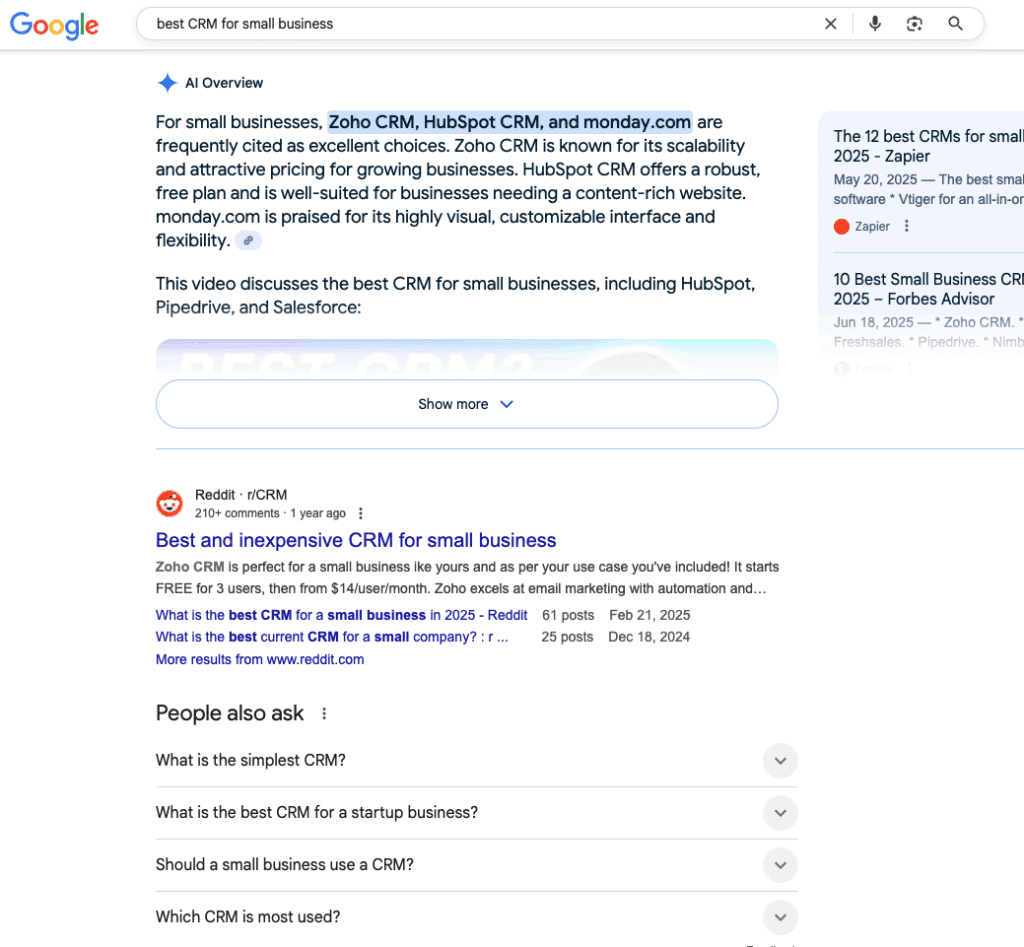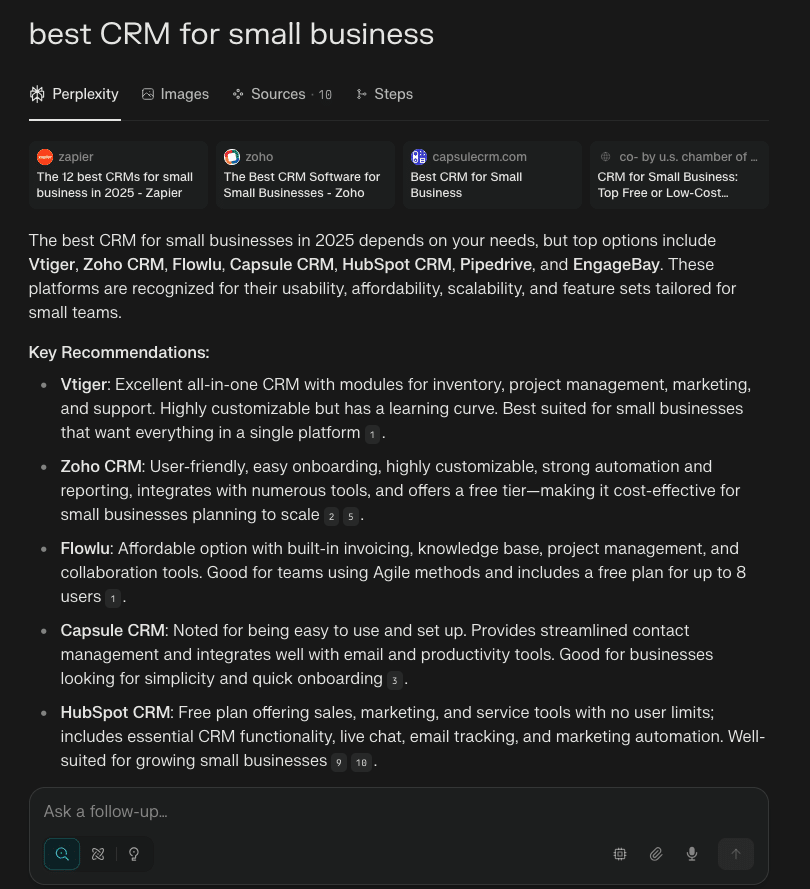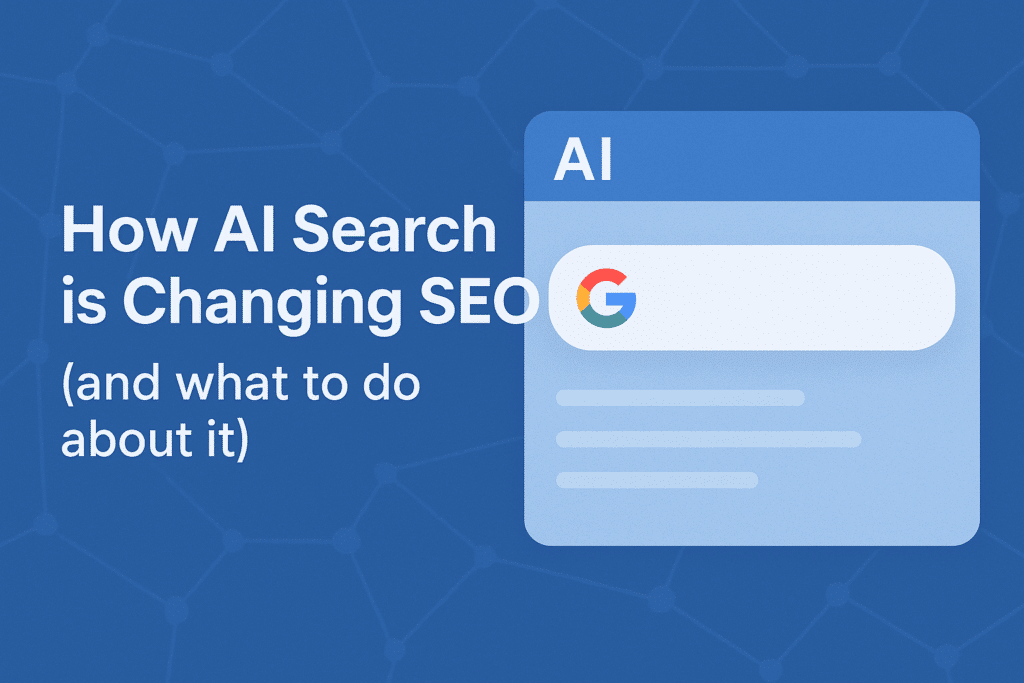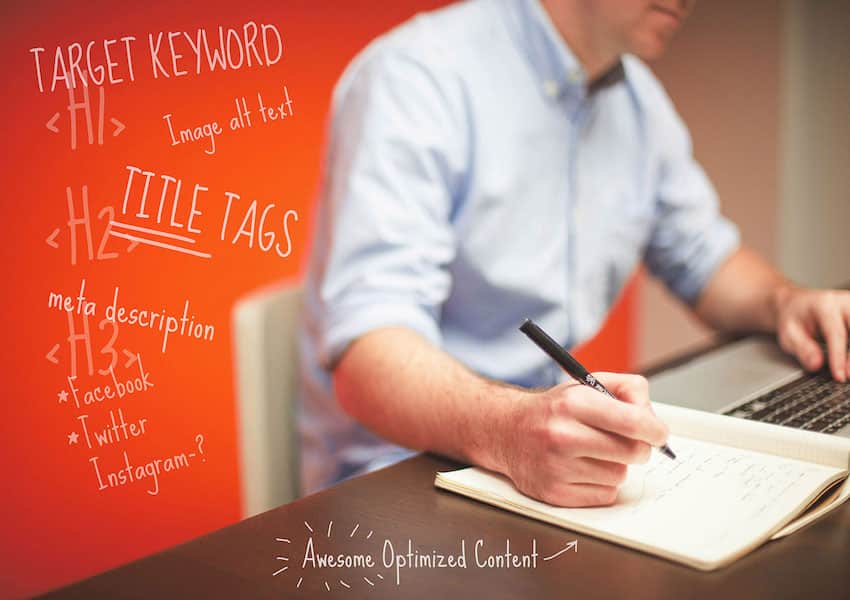Google alone is no longer enough: here’s what smart brands are doing now to future-proof their SEO with AI search optimization.
SEO isn’t dead—but it won’t keep you visible in AI search.
People don’t just “Google” anymore. They ask ChatGPT. They get summaries from Gemini. They rely on Perplexity.
And guess what?
Most of these tools don’t link back. They don’t credit you unless your content is trusted, clear, and built for summarization.
This guide walks you through how AI search optimization helps future-proof your brand—using proven strategies drawn from our work in technical SEO, content optimization, and AI-enhanced search visibility.
Real example: Perplexity is already shaping buyer research
Search “best CRM for small business” in Google, and you’ll see an AI Overview, Reddit, and review articles from HubSpot, Salesforce, and comparison blogs.

But search that same phrase in Perplexity?
You’ll see a summary that quotes specific brands, stats, and advice—and it sometimes doesn’t cite many of the ranking websites.

We’re seeing this more and more:
- Gemini pulls from Google’s own ecosystem (YouTube, News, SGE).
- ChatGPT uses training data + curated plugins, and won’t always credit sources.
- Perplexity shows live citations, but only from high-trust domains.
What is AI Search Optimization (and How Do LLMs in Search Work)?
AI search optimization is the practice of making your content discoverable, quotable, and trusted by AI tools that generate answers from a combination of web content, data models, and semantic patterns.
You’re no longer just optimizing for Google’s algorithm.
You’re optimizing for:
- ChatGPT (OpenAI)
- Gemini (Google)
- Perplexity AI
- And more tools like Poe, Claude, and Microsoft Copilot
These platforms are changing how decision-makers (especially in B2B, SaaS, and healthcare) evaluate vendors, shortlist tools, and get answers. LLMs in search work differently than Google—they generate summaries from topically relevant, trusted sources rather than ranking pages in a list.
At Pure Visibility, our AI SEO experts help brands structure content for visibility in tools like ChatGPT, Gemini, and Perplexity, using a combination of technical SEO best practices and content clarity.
Here’s how the major AI search tools differ—and what kinds of content they favor:
| Tool | Cites Sources? | Live Data? | Best Content Format |
|---|
| ChatGPT | Rarely | No (unless with plugins) | Clear, structured summaries |
| Perplexity | Yes | Yes | High-authority, well-formatted |
| Gemini | Sometimes | Yes | Google-sourced content |
5 Myths About AI Search Optimization (Debunked)
Myth #1: “If I rank on Google, I’ll rank in ChatGPT too.”
False. ChatGPT doesn’t index web pages like Google. It uses training data + live plugin responses (like Bing or browsing tools). It may skip your site entirely if you’re not a known authority—which means you miss out on a potential ChatGPT ranking.
Myth #2: “AI tools cite everything they pull from.”
Not always. Perplexity is citation-friendly, but ChatGPT often paraphrases without attribution. Your insight might be used—but you won’t get credit unless your domain is recognized.
Myth #3: “AI search is years away from replacing Google.”
Not true. In many verticals (developer tools, B2B SaaS, technical how-tos), AI tools are already displacing clicks. People copy summaries without even visiting the source.
Myth #4: “You can’t optimize for AI—it’s random.”
AI models are unpredictable, but not random. Content structure, brand mentions, clarity, and authority signals all influence whether you’re picked up.
Myth #5: “AI will eventually drive traffic back to sites.”
Doubtful. The trend is toward zero-click answers, not more referrals. If you’re not directly quoted or cited, you won’t benefit.
Mistakes to Avoid When Adapting to AI Search
Knowing what not to do is half the battle. These are the most common (and costly) mistakes brands make when trying to “optimize” for AI search:
Mistake #1: Assuming longer content = better visibility
LLMs don’t “read”—they extract. Concise, structured content gets pulled more often.
Mistake #2: Ignoring your brand signals
If your brand name isn’t mentioned in full context, LLMs won’t recognize it. Use phrases like:
“At [Brand], we specialize in…” to reinforce domain/entity alignment.
Mistake #3: No author or expertise proof
AI prefers content from people with credentials. Add bios, links to LinkedIn, or relevant citations.
Mistake #4: Thinking metadata doesn’t matter
Structured metadata (schema, headings, summary tables) still influences how content gets summarized by LLMs like Perplexity.
Use a content optimization checklist to ensure your schema, headings, and FAQs are machine-readable.
#5: Only optimizing blog posts
AI tools pull from guides, PDFs, docs, help centers, About pages, and more—not just blogs.
Now that you know what to avoid, here’s how to win.
So… What Does a Smart AI Search Optimization Strategy Look Like?
Here’s what companies like yours—mid-market to enterprise in SaaS, healthcare, or property management—should focus on now:
1. Run an AI visibility check.
Prompt ChatGPT and Perplexity with questions you want to rank for.
Is your brand mentioned? Quoted? Linked? If not, that’s a signal—it’s time to rework your content.
2. Rewrite key content to be LLM-friendly.
Reformat existing blog posts with:
- Clear summaries
- Bolded takeaways
- Named entities (people, companies, tools)
- Structured data where possible (FAQs, bullets, tables)
For a step-by-step walkthrough, see optimizing content for AI search.
Our AI SEO services focus on reworking your technical SEO and content structure to ensure you’re discoverable across both Google and LLMs.
3. Mention your brand in full.
Don’t assume LLMs know your site. Say:
“[Your brand], ___ based in ___…”
instead of “we help clients with [service]”
4. Build interlinked topic clusters.
LLMs pull more from sites that cover topics in depth.
Isolated blog posts ≠ authority. Build a web of interlinked posts + cornerstone guides.
5. Add human signals.
Authorship, contact info, backlinks, LinkedIn bios—LLMs favor sites with real, verifiable humans.
Example: What a Perplexity-Friendly Blog Looks Like
Instead of this:
“We help healthcare brands improve SEO performance across digital channels.”
Try this:
“At Pure Visibility, our team of senior SEO analysts helps healthcare organizations—like senior living communities and pharmatech brands—optimize their technical SEO and improve visibility in both Google and AI-powered platforms like ChatGPT and Perplexity.”
Notice the difference?
- Entity alignment (company + sector)
- Human authorship
- Clarity + trust signals
SEO Isn’t Dead—It’s Just Getting Smarter
AI search isn’t a fad—it’s a shift.
SEO is evolving fast—and AI search optimization is now critical to staying visible where decisions are made.
If your content isn’t being surfaced, quoted, or trusted by tools like ChatGPT or Perplexity, you’re falling behind—even if Google says you’re ranking #1.
Now’s the time to adapt.
Want to improve your ChatGPT ranking for the terms your customers are asking about?
Let’s talk about AI search optimization for your brand.
If you’d like help running an AI visibility audit or optimizing your most important content for LLMs, we’re here.
Whether you need a content refresh or technical SEO tuning, our team specializes in AI SEO strategy that complements your traditional SEO efforts. Explore our AI-Enhanced SEO services.
FAQ: Top Questions About AI Search Optimization
What is AI search optimization?
AI search optimization is the practice of structuring web content to be easily cited, summarized, and trusted by AI tools like ChatGPT, Gemini, and Perplexity—tools that are increasingly shaping online discovery.
Is AI search optimization a replacement for traditional SEO?
No—but it’s an essential complement. SEO is evolving. Smart brands will adapt before the competition does.
Can I track traffic from AI tools like ChatGPT or Perplexity?
Not reliably. These tools don’t use referral headers like Google does. You can use indirect tracking (e.g., branded search spikes, mentions in LLMs, traffic from ChatGPT plugin URLs).
Does structured data (schema) still matter?
Yes. While AI doesn’t always parse schema the way Google does, semantic clarity still helps. FAQs, lists, product specs—these formats are easier for LLMs to summarize and quote.
Should I create content just for AI search?
No. Create high-value content that works for both humans and machines. But structure it in a way that LLMs can extract key information easily.
How do I know if my brand is in ChatGPT’s training data?
You don’t. But you can test prompts like:
“Who are the top SEO agencies for healthcare companies?”
If you’re not showing up, time to improve your domain visibility.




